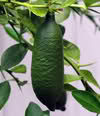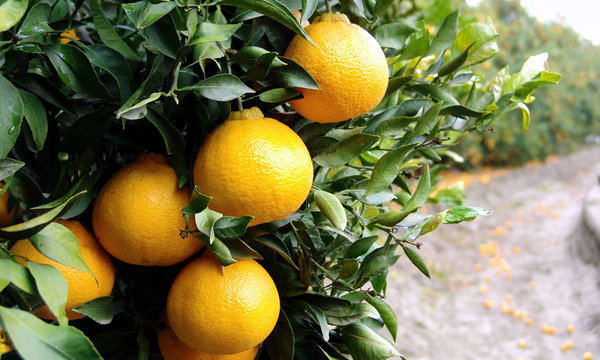http://www.latimes.com/features/food/la-fo-marketwatch-20120210,0,4339226.story
Market Watch: Prized Dekopons arriving
By David Karp Special to the Los Angeles Times
February 10, 2012
 Dekopon (David Karp / January 28, 2011)
Dekopon (David Karp / January 28, 2011)
The Dekopon, a Japanese hybrid of mandarin and orange reputed to be the most delicious citrus in the world, created a sensation last year when California-grown fruit showed up at local groceries under the marketing name Sumo, after a dozen years of secrecy and intrigue. The new crop has started arriving at stores and will be available at the Santa Monica farmers market starting next Wednesday from the Dekopon kingpin himself, Mike George of Lindsay, who grows 16 acres of the variety and organized the group that secured the rights to it.
Large, very easy to peel and seedless, with a distinctive bump at the top, the Dekopon has gossamer-thin membranes enclosing its segments and flesh that feels firm at first bite but then melts in the mouth. The pulp has a perfect balance of sweetness and acidity, and an intense, lingering flavor of Ponkan mandarin, much beloved in Asia and most familiar to Westerners from canned mandarin oranges.
The Dekopons sold at farmers markets by George and his wife, Jonelle, will differ from store-bought fruit because they will be field run, in varying sizes, unwaxed and without stickers. Fruit shipped around the country has to be packed in a commercial facility, but post-harvest scientists have recently verified what farmers have known for decades: that citrus tastes better when it enters a packinghouse than when it exits. Jostling, washing, waxing, heating and time off the tree take their toll. Delicate, thin-skinned mandarins are especially susceptible, so buying Dekopons fresh from the tree at the farmers market definitely has its advantages.
In March, as the Georges are finishing their harvest, John and Cindy France of Richgrove will start bringing their own certified organic Dekopons, which have not been sold before in the United States, to the Santa Monica market.
The prized variety has already started to show up at stores in Southern California, and by this weekend it should be at Bristol Farms, Gelson's, Grow (in Manhattan Beach) and Whole Foods; it will also be available at Asian specialty stores such as Assi Super, Galleria/HK, Greenland, Koreatown Plaza, Marukai, Mitsuwa and Nijiya.
Rival for mandarin title
For the next several weeks, aficionados of fine local citrus will have a chance to try the Dekopon's rival for the title of best-flavored mandarin, Daisy, grown by Louis Diaz of Ranch Mexico Lindo in Valley Center, at the Beverly Hills farmers market. A cross of Fortune and Fremont, but with richer, more complex flavor than either of its parents, Daisy was bred in the California desert and named after Daisy Young, wife of legendary citrus nurseryman Dolan Young.
It's got gorgeously deep orange, smooth skin, so for appearance and flavor it's hard to beat, but it has some significant flaws: It is so seedy you practically need a hacksaw to cut it horizontally; its rind is fairly thin but only moderately easy to peel, and this becomes more difficult after refrigeration; and its acidity drops off within a week or so after harvest (not ideal for long-distance shipment).
The seediness, by far the most substantial of these drawbacks, is overcome in DaisySL, a low-seeded mutation of Daisy released in 2009 by UC Riverside. Without the seeds to muck up its mouth-feel, the variety's excellent texture is unmasked, with flesh that's firm at first bite but melts in the mouth, tender and rag-free.
It takes time for nurseries to propagate trees, for farmers to plant them and for the trees to grow and bear crops, so fruit of the seedless form of this superb variety is not yet available to consumers. The DaisySL's commercial potential won't be clear until it has been planted in production orchards, but it seems likely that it will be the standard of quality for mandarins at farmers markets and in home gardens in years to come.
Beverly Hills market move
This autumn, Diaz and almost two-thirds of the vendors at the Beverly Hills farmers market will have to move around the corner from their current location, says Greta Dunlap, manager of the market, which is run by the Beverly Hills Recreation and Parks Division.
Currently the market is on Civic Center Drive, parallel to and just south of Santa Monica Boulevard. United Talent Agency, which will be moving its headquarters in August to 9336 and 9346 Civic Center Drive, roughly in the middle of the market, has asked the city of Beverly Hills to ensure that it will have access to its driveway on Sunday mornings, says Dunlap.
"We have hundreds of employees engaged in the representation of our many clients, and a great number of our colleagues need access to their offices throughout the evening and weekend hours," said Chris Day, a spokesman for UTA. "We also will be using our complex to entertain clients and to hold film screenings, which during the busy awards season can occur literally around the clock."
As a result, Dunlap will have to move about 40 of the market's 67 vendors, those who are east of UTA's driveway, to another stretch of Civic Center Drive, adjacent to the western edge of the market that runs perpendicular to Santa Monica Boulevard. The market can still use the space for 27 vendors west of the UTA driveway.
The market will lose about 130 of its 650 feet in length, says Dunlap. Just as important, the new location is narrower than the current one, so to keep a central passageway that complies with fire department regulations, the relocated vendors will have to offload their produce and equipment, and then park their vehicles elsewhere.
To be successful, farmers markets rely on a delicate tissue of many factors, including habit, convenience, parking and visibility, and it remains to be seen just what the effect of this partial move will be. The Westwood farmers market never recovered after it was forced to move from its location on Weyburn Avenue, but the Beverly Hills market flourished after it shifted, in 2004, from Canon Drive to its current location.
Meanwhile, farmers are pondering what the effects of the move will be.
"If I have to move and offload my truck, I won't be too happy about it" said Diaz. "But I'll do what I have to do."



























